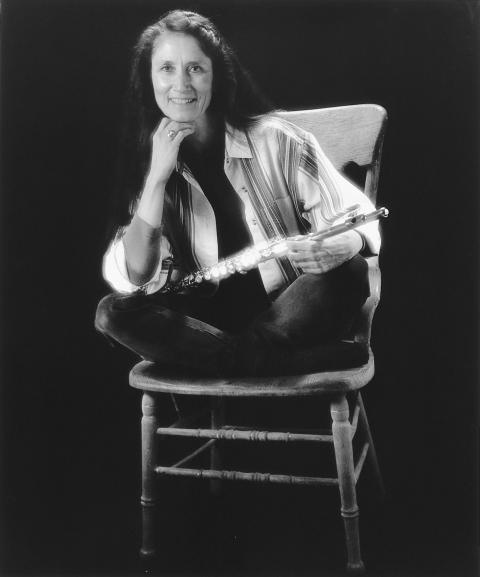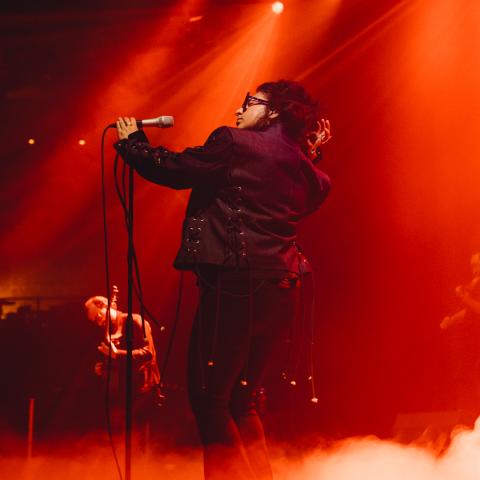First Time in Mississippi

Barbara London, chair of Berklee’s Harmony Department, is a jazz flutist, composer, pianist, and vocalist. She is building her website at www.wildaster.com.
At the University of Mississippi in Oxford, I enjoyed an intensive week studying the Civil War, civil rights, southern literature, architecture, and the blues. The academic adventure was exceptional but exploring the Delta left me with the most visual and emotional memories. I was anxious launching off. I was alone, white, female, and a “northerner.” This seemed to be the biggest liability after a week of discussing “the war of Northern aggression.” I was blessed, however, with perfect February weather and polite, engaging people at every turn. As I headed west on Route 6, suddenly there was a straight line of shoulderless road ahead. Everything was one low level: flat flat flat! My mind was swimming with images from the classes: Grant’s war maneuvers, southern mansions, earthy blues lyrics, and Richard Wright’s story of a black boy hiding in a kiln from snakes, dogs, and a posse.
I located the Delta Blues Museum in Clarksdale near the dividing line between the historically white and black sections of town. I communed alone with the guitar of Big Joe Williams, B.B. King’s “Lucille,” walls of explanations, and huge black-and-white photos of the Dockery Farms, cotton harvesting, and music heroes. The Mississippi Delta is considered the birthplace of the blues. Sister Rosetta Tharpe’s photo caption explained, “There’s something about the gospel blues that’s so deep the world can’t stand it.”
Early Saturday, I drove out of Clarksdale to what used to be the Stovall Plantation. Brick-red farm buildings with silver roofs were surrounded by stately trees and a sea of brown. I talked to a farmer inside a vine-ridden fence. An older man with a dark, weathered face, he had a wool hat with ear tabs, like the ones Aroostook farmers wore when I was a kid. I wanted to ask him about his chores, but instead I stuck to Muddy Waters. When I asked where Muddy’s cabin had rested, he thought out loud, then gestured, “They’ll probably know.” Two large country types in a pickup truck stopped, and said, “Over there by those two trees.” I wondered how many blues pilgrims these people saw. Did they know about the blues? Did they care?
I was awestruck by the expanse of dirt and sky. I walked around in the fields picking up dried roots and bits of last season’s cotton. I had immersed myself in the legacy of African-American music, but I wasn’t prepared for how moved I would feel standing in the fields where people had worked and died. I felt a connection. I thought of my childhood picking potatoes every fall and recalled thinking that farming was important—a sacred thing. I remembered the migrant workers and the Native Americans. I took photos of what I thought was a brook. Later, when I reread how Muddy Waters got his name from playing in a nearby creek, I got a chill thinking how long I spent staring at the vegetation and water where Muddy grew up.
Back-roads intuition got me to Shelby, whose faded, variously colored storefronts made me think I was in the Wild West. I knew I stuck out. A voice from inside a car said, “You gonna take pictures of our town?” I bent down as we started talking. “What do people do here?” I asked. “Drive tractor,” he said. “Only thing you can do. Only thing you can do.” The old man was missing his left eye. His face was lined with life itself. His car was a museum piece. I didn’t know its make, but it was old, big, square, and filthy—filthy cozy. I thought of my brother’s old pickup in Maine with his totems and daughters’ discarded trinkets wired onto windows and fenders.
In Mound Bayou, I entered the police station/municipal building and asked, “Do you have a museum I could visit?” The officer replied, “Well, we have a room of artifacts from the first settlements. Let me see if I can get the key from the mayor, she’s in a meeting.” Minutes later, before I could protest, he ushered me to the back of a small, square room, and said, “She wants to meet you.” Mayor Norman faced me from behind a desk, and eight people turned to stare as she proudly imparted, “Welcome, we are one of the first all-black municipalities in the country.” I groped for appropriate questions to ask and finally got a laugh when I said I didn’t want to interrupt further as I knew how strenuous committee work could be.
Recategorized as an honored guest, I heard someone say, “She should talk to Milburn. Soon as he changes his shirt, he’ll be right over.” Milburn Crowe, the town historian, and I talked most of the afternoon. In a soft, straightforward voice, he told me how Isaiah T. Montgomery and Benjamin T. Green, former slaves of Joe Davis (brother of Jefferson Davis), made a decision to build an all-black town. He described the dangers of clearing dense forests filled with clinging vines, panthers, bears, and snakes. He spoke of disappointments: “Things have changed and then they haven’t,” he said. “Subsidized housing is often put up just outside a city’s limits so people (in those houses) cannot vote in the local elections. It lowers the black voting population.” A natural storyteller, Milburn accompanied me up and down the quiet back streets to the Woods brothers’ pottery business. I bought souvenirs made from Delta mud and said a reluctant goodbye.
At dusk, Tutwiler was an eerie beige-rose color. I took pictures of a barren “downtown,” an ancient hearse beside a storefront with a handwritten sign that read Funeral Home, a relentlessly inquisitive three-year-old, and the train area where W.C. Handy allegedly heard his first blues. On the edge of town, the sun was hitting the horizon, and everything turned golden brown. A few unmarked graves were decorated with wilted artificial bouquets. I almost left before I found Sonny Boy II’s grave hidden in brush down in the back. He was the only one laid to rest with an impressive granite stone inscribed with his blues standards.
My Mississippi trip was more than an off-season blues pilgrimage. The blues served as a jumping-off point and a portal. The Delta made me ask questions with my head and my heart about poverty and farming, urban versus country living, and race and privilege. Then back to the blues: how could a music born out of challenge and suffering have the effect of deliverance for its singers and listeners around the world?
The blues is honest and earthy. It is visceral, not intellectual. Above all, it’s personal. As I wrote this article, my only sibling, John, died. In 1971, when I went on the road to play music, John went off to Vietnam. He came back but was never the same. At his funeral, we asked the musicians to play a country tune and a blues for John. That music was my first release. The blues helps with the contradictions in life. Listen to Son House and to Moses’s comforting, “I don’t worry ‘bout a thing, ’cause I know nothin’s gonna be alright.”
Honestly, I felt afraid to go to Mississippi. I was concerned about safety, but I was more afraid that I would not be welcome. Thankfully, my week there was the best of 2001. It was my first time in the Deep South, and an opportunity to think about American history, slavery, the North and South, black and white, the haves and the have-nots. I appreciated the pride I felt from both white and black southerners when they showed me their towns, even when they spoke of their struggles. People seemed to want me to know them and to return.
Standing with Milburn under the blue inverted skybowl in Mound Bayou, I thought about returning to my frenetic schedule in Boston. I said more than once, “I hope I can come back.” In the final moment, Milburn looked at me and in a gentle, knowing manner said, “You’ll be back.”




